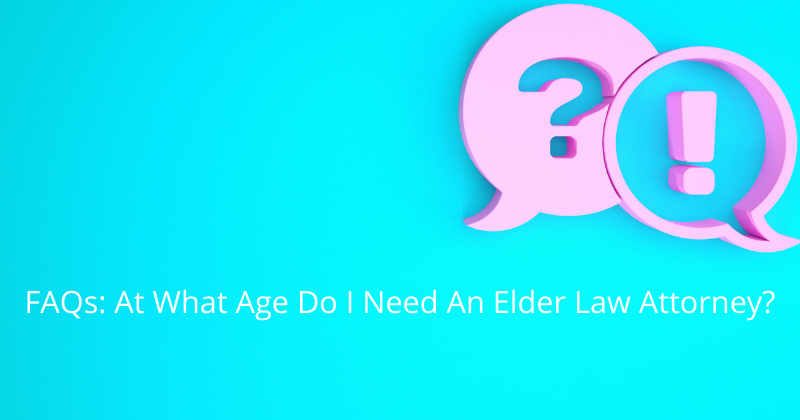
There is no minimum or maximum age to go to an elder law attorney, but by age 60 probably have issues that an elder law attorney can assist you with. A lawyer who specializes in elder law isn’t just for senior citizens – an elder law attorney can help younger clients who need help with aging family members, such as social security, health care, retirement and estate planning.
Elder law refers to a broad range of legal issues that people are likely to encounter as they get older. An elder law attorney draws on their legal experience to help individuals plan for the future and address problems as they arise.
Some of the most common legal matters which elder law attorneys help aging adults with include:
• Estate planning, which may entail drafting wills, establishing trusts, tax planning and other legal issues
• Avoiding the need for guardianships through the durable powers of attorney
• Planning for future housing, medical, and other needs
• Assisting with business and property succession plans
• Advising about guardianship when someone becomes disabled or incapacitated
• Pursuing personal injury or other claims against negligent nursing homes or others
Estate and Probate Legal Group provides the following elder law services:
• Living Wills
Also called an Advance Directive, a living will is a legal document that describes what is to be done if you are left incapacitated in a terminal condition because of a disease, injury, or simply old age, and can no longer communicate your healthcare wishes. Your living will document your healthcare wishes in the event that you’re not able to express them yourself.
• Medicaid and Long-Term Care Planning
Medicaid planning and creating a trust to protect your assets requires the assistance of a skilled trusts and elder law attorney who can evaluate your situation and provide guidance customized to your specific needs.
• Guardianships
Illinois law allows two types of adult guardianships; the term “conservatorship” is no longer used in Illinois:
1. Guardian of the Person
A guardian of the person has responsibility for making decisions regarding personal matters such as health care and housing for the incapacitated person, who is often referred to as the “ward.”
2. Estate Guardian
An estate guardian has the responsibility for caring for the incapacitated person’s property and financial affairs. He or she is responsible for paying bills and managing property and finances. Depending on the circumstances, a ward may need a guardian of his or her person, property, or both.
• Estate Planning
Estate planning is more than just creating a will or trust – it’s creating a series of legal documents that will protect you today and the future of your loved ones. Effective estate planning looks at your goals and the legacy you want to leave for future generations.
• Healthcare Proxy
If you become incapacitated, who do you trust to make your health care decisions? If you don’t appoint a health care proxy, the courts will assign someone to make your medical decisions – and it may not be a person you trust. A Healthcare Power of Attorney is a durable power of attorney, a legal device that allows one person to indefinitely make decisions on behalf of another.
• Powers of Attorney
A durable power of attorney (DPOA) is used to allow the designated person to handle affairs in a specific area of a person’s life, such as in financial or health matters if you become incapacitated.
Learn More: 5@55: 5 Estate Planning Documents For Everyone Over 55
If you’re over 60 and haven’t updated your estate plan or have questions about how to update your plan for the next stage of your life, you should consult an experienced elder law attorney who understands issues faced by aging adults. Estate planning is preparing for the future. Contact Estate & Probate Legal Group in Oak Brook Illinois today at 630-864-5835.